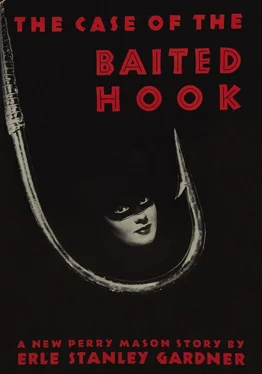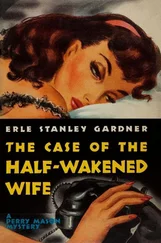She said, “Honestly, Mr. Mason, I’m telling the truth.”
Mason said, “You were in love with Peltham. He wanted to protect you. You came to my office shortly after midnight. You did everything possible to keep me from learning your real identity as well as the nature of the case on which I was to be employed. You subsequently claimed that you had left for Reno late Monday afternoon. Apparently, you were actually in Reno Tuesday morning.
“Considering all of those various circumstances in their proper light, it means that the body of Albert Tidings was lying right here, in that bedroom, at the very moment you were calling on me at my office… Now then, did you kill him or did Peltham?”
“Neither.”
“But you knew he was dead?”
She hesitated for several seconds, then said, almost inaudibly, “Yes.”
“And you were the ones who put him into that room and on that bed?”
“Yes.”
“Who killed him?”
“Honestly, Mr. Mason, I don’t know.”
“Better tell me what you do know,” Mason said.
She said, “I’m going to be frank with you, Mr. Mason.”
“Do,” Mason said, and then added significantly, “for a change.”
She said, “I wanted a divorce. I am very much in love with Bob. Bob had reason to believe that Albert was dipping into the Hastings Memorial Trust Fund. He was working with Adelle Hastings, trying to straighten things out. He wanted her to demand an audit of the books. Under the circumstances, if my attachment for Robert had been discovered, it would have made very serious complications all around. You can understand that, Mr. Mason.”
Mason said tonelessly, “I can understand that.”
Della Street slipped a shorthand notebook from her purse. Mason said, “Don’t do it, Della. I don’t want any of this recorded anywhere… Go ahead, Mrs. Tidings.”
She said, “Albert had been trying to effect a reconciliation. I told him that it was impossible. Bob and I had been to a show. We were driving home. We found Albert’s car parked down near the circle at the end of the road. It was raining hard. Albert was in the car, slumped down in the seat to one side of the steering wheel. He had been shot and was unconscious. We stopped our car. Bob and I got out in the rain and tried to see how seriously Albert was injured. There was still a faint pulse. He had been shot in the chest. We realized that we couldn’t do anything in the space there was inside the car. I told Bob he’d have to help me get Albert into the house, and then I’d telephone for a doctor and the police.
“Together, we got him out of the car and half carried, half dragged him into the house. We put him on the bed. I ran to the telephone, and was just on the point of putting through the call when Bob called to me. He said, ‘It’s too late now, Nadine. He’s dead.’
“I ran back to the bed. There was no question about it. I suppose that in moving him, we’d started the hemorrhage — making it more severe. Anyway, he was dead. There wasn’t the faintest pulse.”
“What did you do?” Mason asked.
“Bob told me that I couldn’t be dragged into it, that he would skip out and keep in hiding, that this would tend to direct suspicion to him, that it would be better for me to put my car in a garage somewhere and take a plane to Reno where I had friends. I could claim that I’d driven up there. By leaving the house door open and unlocked, it would make it appear he’d broken in in my absence.
“We talked things over and decided that here in the house it might be quite a while before the body was discovered, that I might be able to build up an alibi that would hold water. It would help my alibi to have the time of death appear to be as late as possible. There was mud on his shoes, mud stains on the counterpane of the bed. We realized that these might help fix the time of murder. So we took off his shoes and topcoat, pulled the mud-stained counterpane out from under him, and wrapped them up in a bundle.”
“What became of them?” Mason asked.
“I don’t know. Bob took them. He said he’d take care of them.”
“Then what did you do?”
“Then I drove Bob’s car, and Bob drove Albert’s car. He wanted the car discovered as far away from the house as possible. We parked the car and then telephoned you. Bob said you could protect me if anyone could, but he pointed out that if my alibi in Reno held up, I wouldn’t have any need for an attorney, that if they didn’t discover Albert’s body for four or five days, no one could tell exactly when he’d died, and that if I could get a lucky break, I might be able to keep absolutely out of it.
“We’d managed things very circumspectly. No one in the world had any idea that Bob and I were… were… that we cared for each other.”
Mason said, “You overlooked one thing.”
“What’s that?”
“On the California line near Topaz Lake there’s a state quarantine checking station. They check the cars that go through, particularly the cars that come into the state. They keep a record of license numbers… You went to Reno by plane?”
“Yes.”
“And stored your car?”
“Yes.”
“Where?”
“In a small garage where I sometimes keep it.”
“Do they know you?”
She smiled and said, “Not as Mrs. Tidings.”
“Under another name?”
“Yes.”
“Mrs. Peltham?”
“No, not Mrs. Peltham. Mrs. Hushman.”
“Who’s Mr. Hushman?” Mason asked.
She lowered her eyes, then after a moment said, “Mr. Peltham.”
There was the sound of a car being driven rapidly past the house. The tires screamed a protest as the machine was whisked around the turntable. Della Street, getting up from the chair in which she was sitting, crossed over to the window to look out.
“A police car,” she said to Mason.
Mason’s eyes narrowed. “Mrs. Tidings,” he said, “I want you to promise me one thing. Make absolutely no statements. Refuse to answer any questions.”
“But surely, Mr. Mason, you don’t think…”
From the window, Della Street said, “Sergeant Holcomb and an officer are getting out. They’re coming toward the house.”
“Will you promise me?” Mason asked.
“Yes.”
“Remember, your life depends on keeping that promise.”
“But, Mr. Mason, they can’t touch me, regardless of how I went to Reno. I certainly was there by five o’clock Tuesday morning, and the testimony of Albert’s secretary shows that he was alive and well until noon on Tuesday.”
“Did you,” Mason asked, as steps sounded on the porch, “know that Mattern was going to do that?”
“No, of course not. It was just a lucky break for us.”
Mason said, “Well, there’s one thing wrong with that. It isn’t the truth. Any time you go to court relying on something that isn’t the truth, your whole defense may collapse under you. I don’t handle my cases that way. I find out the truth, and build up my defense on a solid foundation… Now then, if you killed him, I want you to tell me.”
“I didn’t kill him.”
The doorbell rang steadily and insistently.
“If you’re lying to me,” Mason said, “heaven help you.”
“Mr. Mason, I’m telling you the absolute, honest truth. I’ve lied to you before. Now I’m telling you the truth.”
The doorbell continued ringing, and was supplemented by the pounding of imperative knuckles on the panels of the door.
“If you didn’t kill him,” Mason asked, “who did?”
“Honestly, Mr. Mason, I haven’t the faintest idea. It must have been someone over that trust fund. Sometimes I’ve suspected…”
The door groaned against pressure as the officers pushed their shoulders against it.
Читать дальше












